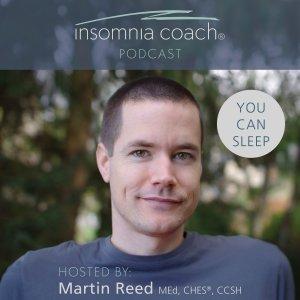Insomnia Coach® Podcast

How Eileen used CBT-I techniques to improve her sleep after taking sleeping pills almost every day for 15 years (#11)
Eileen is a registered nurse of almost 30 years. She was always a light sleeper who felt that she needed perfect conditions for sleep to happen. After becoming a parent she started to get less sleep and this triggered more sleep-related stress and worry that made sleep even more difficult. Before long, Eileen became totally focussed on sleep and soon developed the mistaken belief that she just couldn't sleep. After seeking help from her physician, Eileen ended up on Ambien — a drug she took almost every day for 15 years. In this episode, Eileen describes how insomnia became part of her identity and how she went from constantly worrying about sleep and struggling with sleep to someone who now sleeps very well without sleeping pills. Eileen's willingness to implement cognitive behavioral therapy for insomnia (CBT-I) techniques (and her positive attitude!) helped her get to the point where she is now able to relax at night and let sleep happen naturally. Eileen no longer worries about sleep and, as a result, she is able to relax at night, get into bed, and sleep. Click here for a full transcript of this episode.Click here to hide the transcript. Martin Reed: Welcome to The Insomnia Coach Podcast. My name is Martin Reed. I believe that nobody needs to live with chronic insomnia and that cognitive behavioral therapy for insomnia (CBT-I) techniques can help you enjoy better sleep for the rest of your life. Martin Reed: Okay, Eileen. Thank you so much for being on with us today. Eileen Reali: Thank you for having me. Martin Reed: Let's get the ball rolling here. Can you tell us how long ago your sleep problems initially began, and can you remember what initially triggered the sleep disruption? Eileen Reali: Oh, I always was a light sleeper, and I had to have perfect conditions for me to go to sleep. I couldn't sleep in a car or on a plane. I would have to be laying in bed in the dark with no noise. Then when my kids were young, I noticed I'd be up a lot with them and I was getting less sleep, so I would start to stress about that, and then the more I stressed about it, the less sleep I was getting. And the more I was concentrating on the hours I was in bed and not sleeping, the less sleep I was getting. It was just a vicious cycle. Martin Reed: Mm-hmm (affirmative). Yeah, that is so common. I'm not sure if you're familiar, if we ever discussed this, but we have this model for insomnia called the 3P model. Have you heard of that? Eileen Reali: No, I haven't. Martin Reed: Okay. This is a model that we use to kind of describe how just this initial sleep disruption, how a one-off night of bad sleep can kind of develop into a longer term problem. It's based on this idea that there are three Ps. Okay. The first P is this predisposing factor. The P stands for predisposing. This can apply to people, if we're light sleepers, like you just mentioned, if we're naturally light sleepers, we're more predisposed to sleep disruption. If we have a stressful job or if we're just more reactive to stress or anxiety or worry or if we're really strong night owls or really strong morning larks. Martin Reed: But we can kind of progress on to this precipitating factor, this event that makes this sleep disruption occur. I would say that a big life change, even something more minor, like an argument with a spouse just before bed, that can lead to a bad night of sleep. Or, in your case, a big life change, having children, and then the children disrupt your sleep. These are all these precipitating factors. But, again, we're still onto just this initial short-time sleep disruption.






 Visit Podcast Website
Visit Podcast Website RSS Podcast Feed
RSS Podcast Feed Subscribe
Subscribe
 Add to MyCast
Add to MyCast